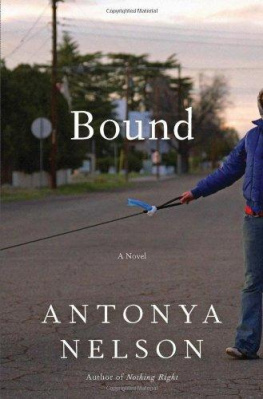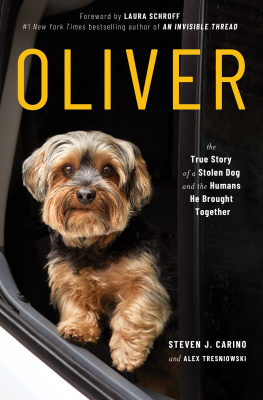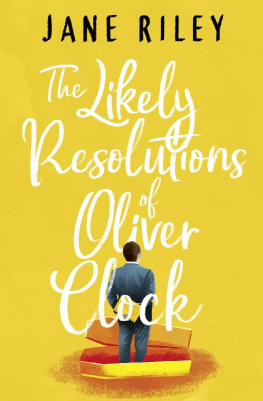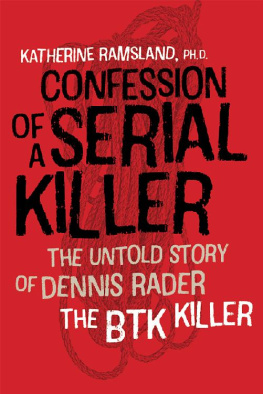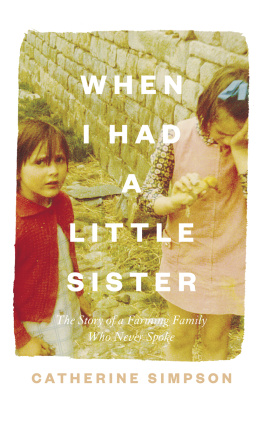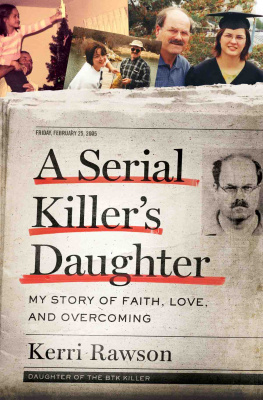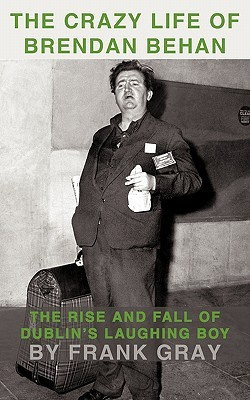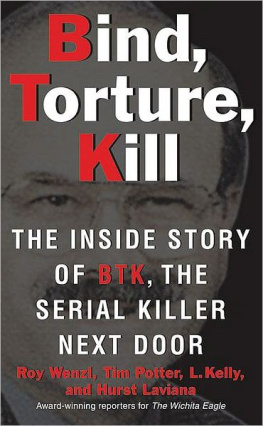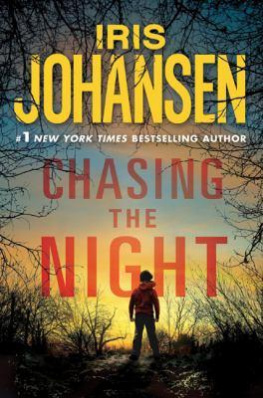
BOUND
a novel
ANTONYA NELSON
New York Berlin London
To Laura Kasischke, in friendship
CHAPTER 1
T HE DOG HAD two impulses. One was to stay with the car, container of civilization, and the other was to climb through the ruined window into the wild. Wait with the woman, or dash toward the distant rushing water?
The woman hung suspended, patiently bleeding, barefoot, allover powdered by deployed airbag dust, one palm open like a forget-me-not in her lap, the other hand raised unnaturally high, as if thrown up to respond to a question, fingertips caught in the teeth of the ripped-open moon roof. A signal chimed, tiredly announcing that a door was not latched, or a passenger was not buckled, or a light had been left on, or that some other minor human infraction had been committed. The machine was made to attend to these. Additionally, the tape player played on, a man reading aloud. In other instances, recorded sound sometimes roused the dogs interestanimals on television or computer, the doorbell at home in Houstonbut not this mans voice.
This was the cars third accident today. For nearly thirty years, its driver had not had an accident, not since high school. Then in one day: three. First a bashed bumper at the liquor store parking lot in El Paso, she and another woman backing out directly into one another. From above, it might have looked choreographed, perfect comic symmetry, a gentle jolt, the sudden appearance of a car bumper right where there hadnt been one in the rearview mirror. Or like film footage, run in reverse, people parking, unparking. This first accident, which had produced no problems, bumpers doing their jobs, had been in Texas, the next one in New Mexico, and the third in Colorado. The second accident, in New Mexico, was clearly the fault of the dogs owner. Headed north through a tiny town made of trailers, shed run its only shot-blasted stop sign and been clipped by a westbound pickup. Its driver jumped furious from his cab, shouting and pugnacious before shed even shifted into park. Her right taillight had been sheared off by his too-big tow bar. The dog would not stop barking at the angry man. For ten minutes the two drivers had had to circle and study their vehicles, the man venting his significant frustration, which took the form of rhetorical questions concerning the whereabouts of her mind, not to mention her driving barefooted.
What are you, drunk ?
Hungover, the woman thought, but not drunk. She shook. Her response, often, was to retreat to silence. This had made her a formidable adult, although shed been mistaken as sullen or dull-witted when she was young. The man finally convinced himself that he wasnt at fault, nor was his truck damaged. And he couldnt much care about an unpretty woman. The drivers left the scene of the accident without reporting it. The other cars that passedboth local and tourist gawkersslowed but did not bother to stop, interested to know if the verbal antics would escalate into something truly entertaining, since clearly thered been no carnage.
They wanted mayhem.
The dog had not ceased barking until her owner settled behind the wheel, slammed the door, blinked into the setting sun from behind sunglasses she had not removed, and turned over the engine. Then they were restored to their humming, air-conditioned peace. For miles, the woman talked to the dog as if to prove that she could, her hands trembling when she finally put in the first cassette of her borrowed book on tape. Heart of Darkness, its narrator intoned, and thus began the story.
Now the dog was busy navigating a nervous figure eight between back seat and front, stepping gently past the gearshift, tightly circling the passenger seat, her tail inadvertently sweeping beneath the drivers upraised arm, near her hinged, leaking mouth, then squeezing once more over the gearshift, onto the back seat and into her metal kennel, which was intact, although upside down. There she made the motion of settling, albeit on the ceiling rather than the floor of her cage, hopeful that obedience would reinstate known order.
Obeying was her first instinct; shed been performing these moves, tracing this circumscribed looping path, every minute or so, since the car had gone off the highway and down the cliff. She stepped from the kennel and shook in her abbreviated space, sat suddenly and awkwardly on her tail, like a bear or raccoon, and curled forward to lick at her belly, tempted once more by the sense of the flowing stream beyond the car, yet dutiful to the woman inside. Far above, on the highway from which the car had fallen, a truck downshifted, straining against its own massive weight and force, roaring gradually by. The dog had been whinnying every now and then, an uneasy chatter in her throat, but now squared her front feet on the car console and barked close to the womans head, teeth snapping unnaturally near the pink cheek flesh, tail waving with hope, anxiety. She had eyebrows, this dog, which gave her the appearance of intelligence, as if she could read minds or understand complicated speech. The woman was in the habit of talking to her. Certain wordsWalk! Treat! Home!as well as certain tones of voice inspired a reply. The dog barked again, as if to begin their usual exchange, taking the lead, and then again, insistently, demanding a response, even one of anger, then put her nose to the womans temple, tasted the blood there, whimpered, her tail now swinging low, pendulum of shame. The mans voice, steadily reading. The other sound, the one she could more truly heed, that of the stream.
She stepped gingerly over the woman, dropped to the damp cool ground outside, stood for a moment with her nose to the air. Without its familiarities, the car evaporated from her attention, sucked into the overwhelming enormity of the rest of the world. She dashed headlong toward the water. Plunging in, she was startled by the current; she flailed and her eyes rolled, panicked and wild. She raised her neck, scrambled, and only occasionally, and only momentarily, found purchase on the rocks beneath. Down the stream she flew, borne on an icy journey, through a slight and shadowy canyon, her body thrown sideways around one bend, backward around another, her chest scraped lengthily over a jutting cluster of boulders in the last rapids, again and again her muzzle submerged and blasted, and then, finally, she was deposited into a still pool, a wide clearing where the water abruptly sprawled, stalled, where its temperature gradually rose, milder. On the banks, grazing deer.
The dog climbed out through tall saturated yellow grass, through dying pussy willows and stagnant silt, and onto a large flat red stone that still held the late-afternoon warmth from the sun. Here she lay panting, quivering. Her feet were tender and there was a new rip on her belly from the rocks. Wet, she showed her wolflike physique, the slender sneaky profile of her face, the alert damp fan of her tail. Her coloring was dark, her thick fur stippled, and her tongue mottled, like a chows, but her slender skeletal underpinnings were those of a wild creature, fox or coyote, something nocturnal and sly. Her owner had liked that about her, the grateful and frightened girl whose appearance daunted, her loyalty and love that of something rescued from cruelty. Shed lived on garbage; shed slept with her eyes open. She was strange looking, skittish, intimidated and intimidating. She answered to Max. On her neck she had worn a collar, but now it was gone, torn from her when the car flew off the mountain and rolled over the talus and into the trees below, or snatched away in the turbulent trip down the stream. In the flesh of her neck she had had a surgical procedure to install a microchip that identified her. Some shelters, some veterinarians, knew to scan lost animals for those. Some didnt.
Next page
